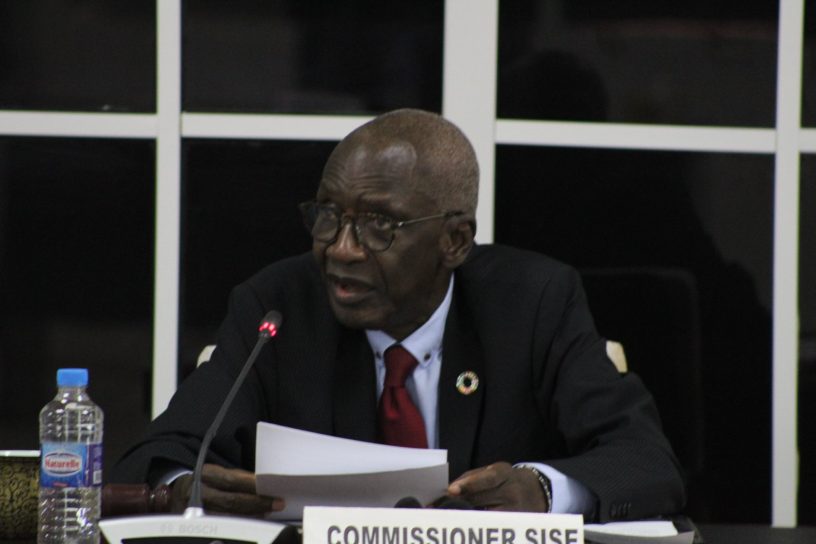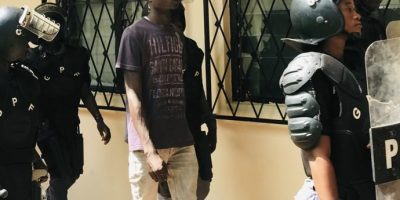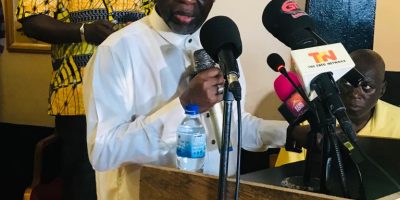 On Thursday, June 25, 2020 the TRRC concluded its fourteenth three-week session of public hearings. During that session, 21 witnesses appeared before the Commission. The total number of witnesses appearing before the Commission since the commencement of the public hearings on January 7, 2019 is now 241. These include 59 women, 44 perpetrators, alleged perpetrators and adversely mentioned persons, as well as four expert witnesses. Twenty five Gambian Diaspora witnesses also testified via video link.
On Thursday, June 25, 2020 the TRRC concluded its fourteenth three-week session of public hearings. During that session, 21 witnesses appeared before the Commission. The total number of witnesses appearing before the Commission since the commencement of the public hearings on January 7, 2019 is now 241. These include 59 women, 44 perpetrators, alleged perpetrators and adversely mentioned persons, as well as four expert witnesses. Twenty five Gambian Diaspora witnesses also testified via video link.
On June 8, 2020 when we began the Fourteenth Session of the public hearings of the Commission, we indicated that, with the commencement of our institutional hearings, the session will focus on the Prison System, specifically on the violations and abuses of the human rights of the prisoners and other detainees held at the three prisons in The Gambia. The Commission called the following to testify: past and present prison officials and staff; current and past prisoners and detainees as well as their family members or relatives.
What emerged from the testimonies of these witnesses shocked the conscience of many Gambians. It was an outrage of extraordinary magnitude to hear the failures of the prison system and the violations and abuses of the human rights of prison inmates. It is clear from the evidence adduced before this Commission that the system utterly failed to address, inter alia, the following challenges:
(1) proper understanding by prison officials of the Prison Act that governs their institution,
(2) massive overcrowding in the facilities, especially the Remand Wing,
(3) poor quality food which many attributed to the cause of non-communicable diseases such as beriberi,
(4) theft by prison officers of food rations supplied to feed prison inmates,
(5)unlawful denial of access to and/or inadequate medical services for inmates with serious consequences and even death of prison inmates,
(6) poor and inhumane conditions of detention in the prison facilities,
(7) inadequate focus on mental health issues for prison inmates,
(8) unavailability of reform and rehabilitation programmes for inmates with the consequent effect of rendering the prison system as a mere warehouse to keep prisoners, and
(9) brutal torture and unlawful confinement practices, including unreasonably long detention of inmates in the Remand Wing.
Many of the above challenges have resulted in neglect and even death of inmates while in custody.
The Prison Service, like the rest of the country, was trapped in fear and incompetence during the twenty two years of the Jammeh era. For the greater part of that period, the highest academic qualification attained by prison officers was Secondary Four certificate. The deplorable conditions and violations and abuses committed in the prisons will, no doubt, be addressed in the final report of the Commission with recommendations on how to remedy the situation. The Prison Service must not be used as a source of self-gratification for senior prison officials, or turned into a torture facility that defeats the rehabilitative function of a correction system.
Furthermore, the Prison Service must not be used as an open access detention facility for political opponents and security officers. Any person detained at a Gambian prison must go through due process and be admitted for detention through the appropriate procedures. Both prison officials, prisoners and other detainees have rights, and those rights must be fully respected. The rules and regulations pertaining to the operation of the prisons must be adhered to strictly, and at all times.
The current session of the Commission’s public hearings opens today with the completion of testimony by Mr. David Colley, the former Director General of the Gambia Prison Service.
A brief reminder that when the public hearings of the TRRC were suspended in March due to the government rules in response to the COVID-19 pandemic, the Commission was hearing testimonies on the violations of the rights of road users by Yahya Jammeh’s convoys. The public hearings on that theme were not completed. The Commission will return to that theme and hear the remaining witnesses who were already scheduled to testify.
As we encountered during the Commission’s consideration of the themes on Sexual and Gender-based Violence and the former president’s witch hunting exercise, it has been equally challenging for the TRRC to get witnesses on the theme of Jammeh’s alternative HIV/AIDS treatment programme. This is understandable because of the social stigma associated with all these three issues.
These challenges notwithstanding, the TRRC continues to encourage all victims of the former president’s activities, be it road users or the Alternative Treatment Programme, to please come forward and share their stories with the Commission. In that event, the TRRC assures them that their privacy and integrity will be respected and protected.
I am happy to report that the Commission’s Reconciliation Committee with the assistance of the Secretariat’s Reconciliation Unit, facilitated a reconciliation event on July 1, 2020 between several witnesses – both victims and perpetrators – who have appeared before the Commission. The event underscores the TRRC’s commitment to not only discover the human rights violations that happened here during our mandate period, but also to the promotion of reconciliation in our country. We thank all who participated in that reconciliation event and hope that they have found a measure of peace and closure from the exercise.
Finally, as we begin another session of public hearings, we seek the public’s continued support and understanding as we go through this difficult journey of truth-seeking with regard to the human rights violations and abuses that occurred in our country from July 1994 to January 2017.
Thank you all for your very kind attention.
Source: TRRC




Ma sha Allah great and thanks for sharing